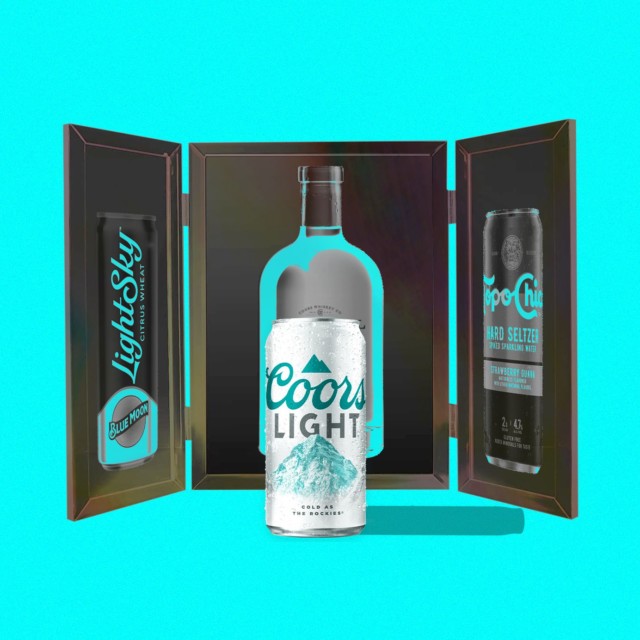In what I imagine was the most interesting earnings call in recent beer history, Molson Coors CEO Gavin Hattersley shared with investors on July 29 that the company saw its best quarterly top-line growth in more than a decade. It will drop 11 budget beer brands, including close to 100 SKUs; and it will lean into “beyond beer” products including mainly hard seltzers such as Vizzy and Topo Chico Hard Seltzer. (Not Coors Seltzer, though, which sadly retired last month, less than a year after its launch in September 2020. So much for my summer of Coors Seltzer Orange Cream Pop Tipsy Scoop Ice Cream.)
Less than a week later, on Aug. 4, Molson Coors announced another shocking development — Five Trails blended American whiskey will launch under Coors Whiskey Co. on Sept. 1. It’s legit, too — the whiskey is a blend of three Bardstown Bourbons and a Coors malt-based whiskey.
Along with Miller Lite and Coors Light, Hattersley said on the call that “our above premium portfolio did very well … with the Blue Moon franchise coming back strongly,” and later stated, “In the U.S., Blue Moon LightSky was the No. 1 new beer item in 2020 and has grown double digits this year.”
Molson Coors is popping right now. It’s growing even as beer consumption and market share decline. It made alcohol out of Topo Chico, which is basically like Jesus taking the trendiest mineral water possible and turning it into wine. And now it’s launching a legitimate-sounding blended American whiskey produced by, and with, a bona fide Bardstown bourbon distillery.
Molson Coors clearly made the right decision when it hired Hattersley as CEO in 2019. His premiumization play is actually proving successful — even if Molson Coors’ global beer production is a fraction of AB InBev’s or Heineken’s, it’s interesting to see that strategy paying off.
Boston Beer Is a Boozy Iced Tea and Lemonade Brand
A recent tweet by Beer Marketing Insights lit up our feeds with the following: Truly and Twisted Tea accounted for 84 percent of total volume for Boston Beer in the four-week period ending July 10, according to NielsenIQ. Samuel Adams accounted for a wee 7.9 percent — and that includes all Sam Adams beer, from Boston Lager and seasonal ales, to its more recent line of Wicked Hazy IPAs.
Boston Beer’s own second-quarter 2021 results showed net revenue was $1.15 billion, “an increase of $365.2 million, or 46.7 percent, from the comparable 26-week period in 2020.”
We know Boston Lager is Jim Koch’s first love (and second, third, and fourth). We also know he loves business. Truly is his moneymaker. What’s not to love about that? At least Sam Calagione and Dogfish Head still get to do silly fun things like scratch-and-sniff beer packaging and goofy Reddit ads in the meantime.
In the end, brands need to follow what the people want — if what they want is to appeal to the masses. Craft is commercial. Commercial is competitive. And if Boston Beer wants to watch Sam Adams drown while its production pumps out lemonade, I’m not one to stop them. (I will, however, roll my eyes when the Brewers Association announces its next craft beer definition includes boozy ice pops, and it “has nothing to do with Boston Beer.”)
Beer Institute Survey Says Most Americans Want Nutrition Labels on Beer
A recent survey released by the Beer Institute (BI) says that Americans — 75 percent of respondents — say they believe alcoholic beverages should have nutrition labels, and 78 percent support the Brewers Voluntary Disclosure Initiative, a BI-led program detailing the beer industry’s commitment to nutritional information on beer labels.
Who is part of this thoughtful initiative, you ask? Anheuser-Busch, Molson Coors, Constellation Brands Beer Division, Heineken USA, and FIFCO USA. Yup, all the big boys — and not a single one of the 8,000-plus other breweries operating in the U.S. today.
The “majority” of Americans — or more accurately, the majority of a 1,500-person survey conducted over the course of two days — will likely be surprised to know that the Brewers Voluntary Disclosure Initiative is impossible for a majority of brewers. Small brewing companies can’t afford the packaging, lab testing, or time. But if this is Big Beer’s play against the Brewers Association’s Independent Beer label? Nutrition labels will definitely win.
This story is a part of VP Pro, our free platform and newsletter for drinks industry professionals, covering wine, beer, liquor, and beyond. Sign up for VP Pro now!
